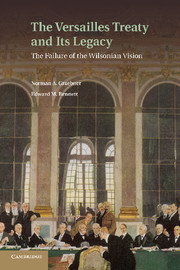Book contents
- Frontmatter
- Contents
- Preface
- 1 The International Order on Trial
- 2 The Road to Paris: 1917???1918
- 3 Versailles: A Study in Arrogance
- 4 The Retreat to Utopia
- 5 Manchuria and the Triumph of Non-Recognition
- 6 The Rise of Hitler
- 7 Challenge of the Dictators
- 8 The Elusive Response
- 9 Munich: The Continuing Escape from Reality
- 10 The Road to Prague
- 11 The Soviet Quest for Collective Security
- 12 The Coming of War: 1939
- Bibliography
- Index
- References
3 - Versailles: A Study in Arrogance
Published online by Cambridge University Press: 07 October 2011
- Frontmatter
- Contents
- Preface
- 1 The International Order on Trial
- 2 The Road to Paris: 1917???1918
- 3 Versailles: A Study in Arrogance
- 4 The Retreat to Utopia
- 5 Manchuria and the Triumph of Non-Recognition
- 6 The Rise of Hitler
- 7 Challenge of the Dictators
- 8 The Elusive Response
- 9 Munich: The Continuing Escape from Reality
- 10 The Road to Prague
- 11 The Soviet Quest for Collective Security
- 12 The Coming of War: 1939
- Bibliography
- Index
- References
Summary
I
Wilson’s reception in Paris was tumultuous. The throngs that lined the streets cheered and wept, hailing him as the savior of France. His reception in London was scarcely less rapturous. The King lauded the American contribution to victory. The President, in response, included no reference to Britain’s role in the Allied triumph. Nor in addressing the French House of Representatives later did he recognize the heavy price that France had paid for victory. What mattered to him was the American role. The public adulation the President experienced in Paris and elsewhere reaffirmed his conviction that he alone carried the hopes of the world’s masses for a peaceful and progressive world order. The vision was glorious; the realities, less so.
Wilson’s conception of a Europe united behind his leadership contrasted with the actual state of European opinion. When the peace conference opened on January 12, 1919, with delegates from thirty-two countries jamming the city, the crowds in Paris were tense and unruly. David Lloyd George later declared before Parliament: “I am doubtful whether any body of men with a difficult task have worked under greater difficulties – stones crackling on the roof and crashing through windows, and sometimes wild men screaming through the keyholes.” Correspondents had warned Washington repeatedly that the inflamed state of French opinion made Paris the least desirable of all European cities for the conduct of peace negotiations.”
- Type
- Chapter
- Information
- The Versailles Treaty and its LegacyThe Failure of the Wilsonian Vision, pp. 38 - 66Publisher: Cambridge University PressPrint publication year: 2011



